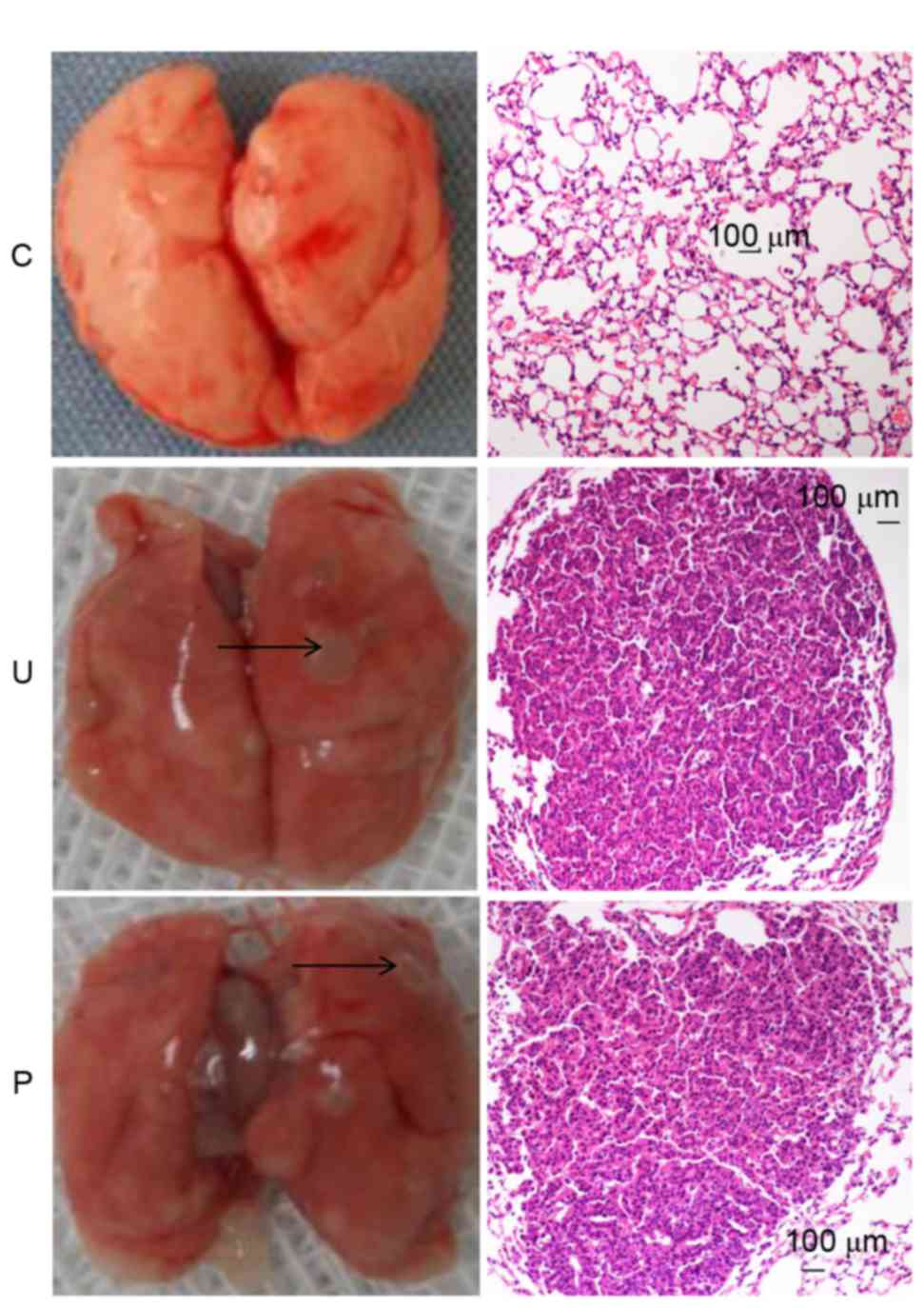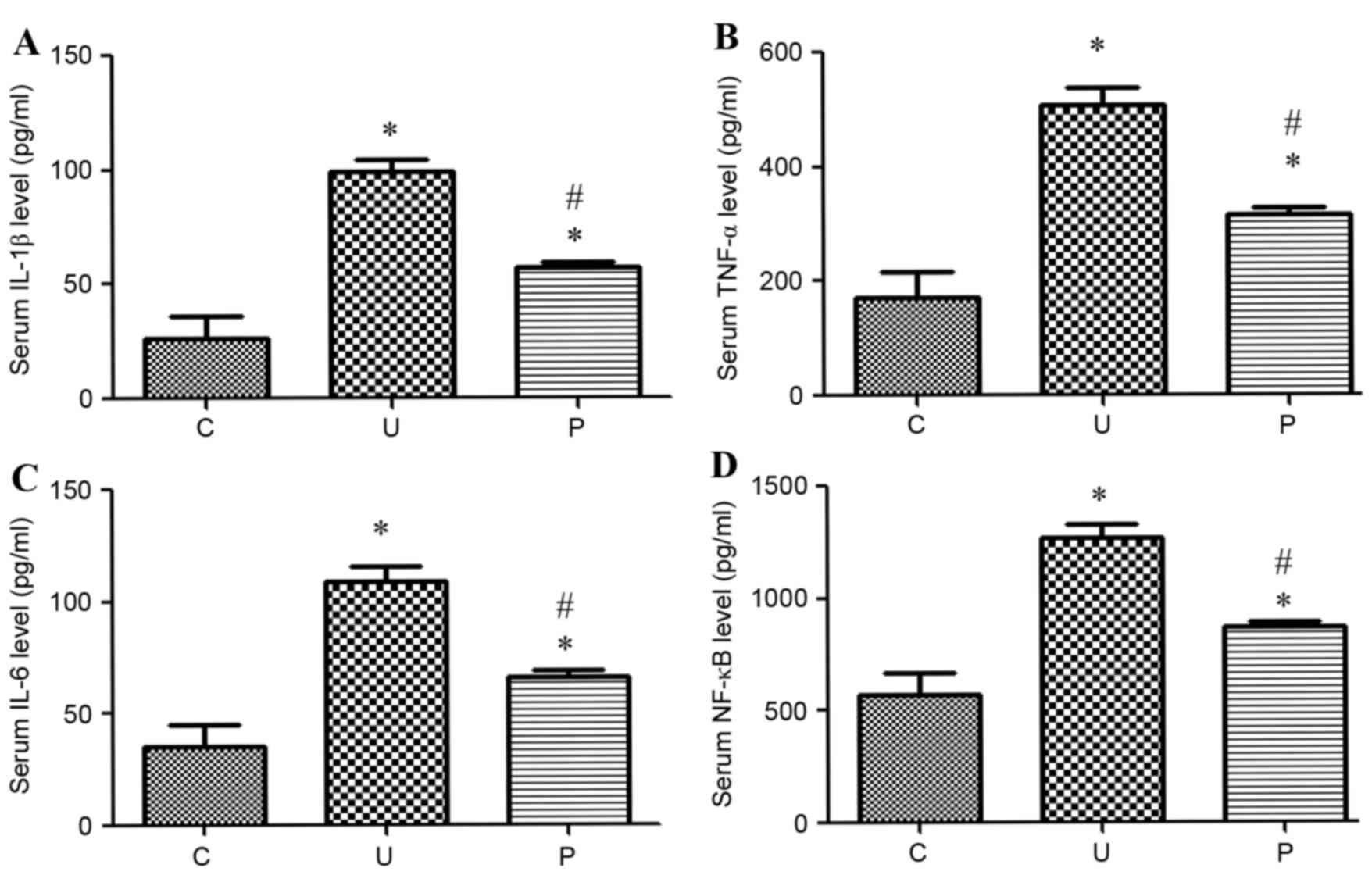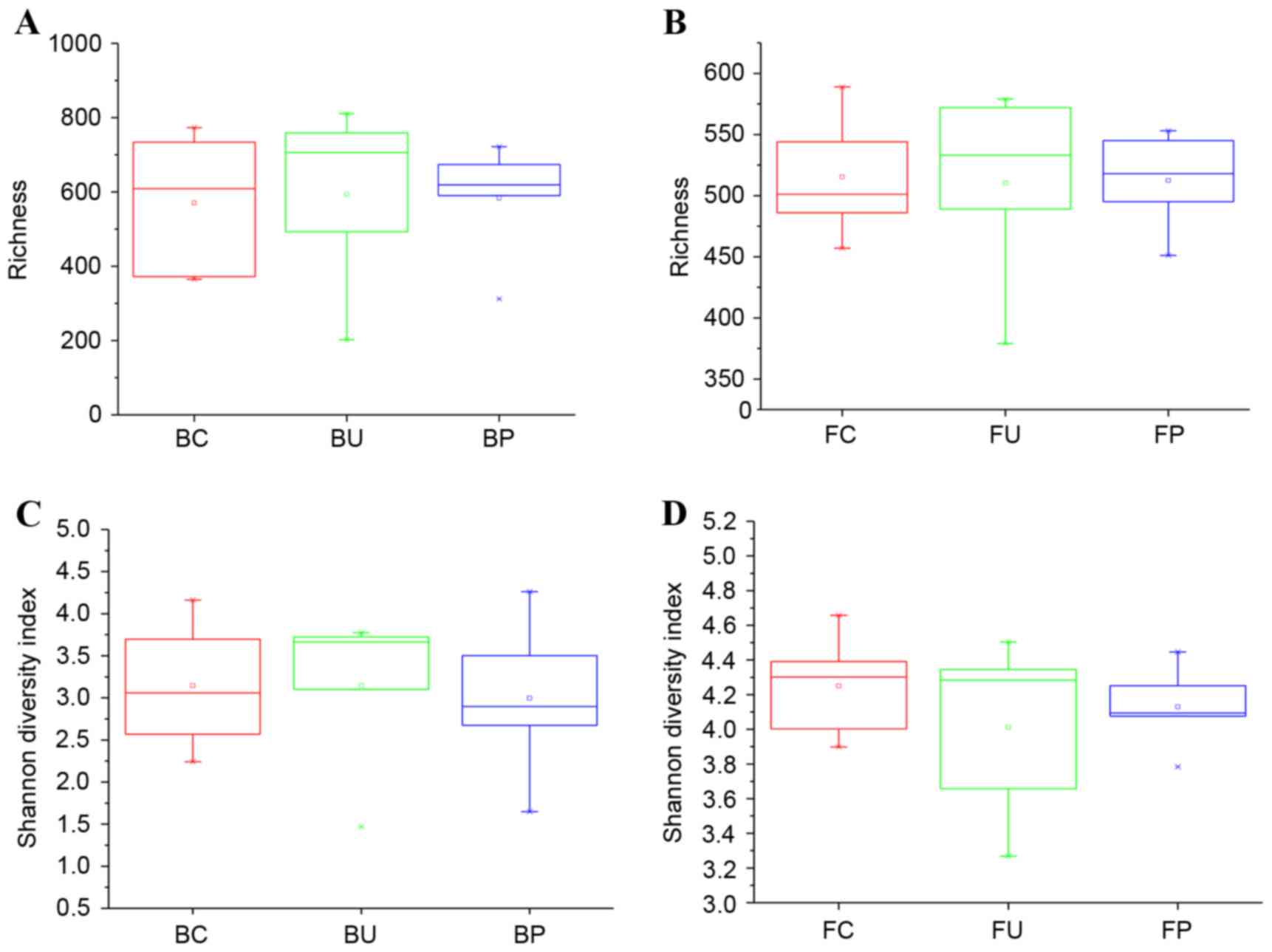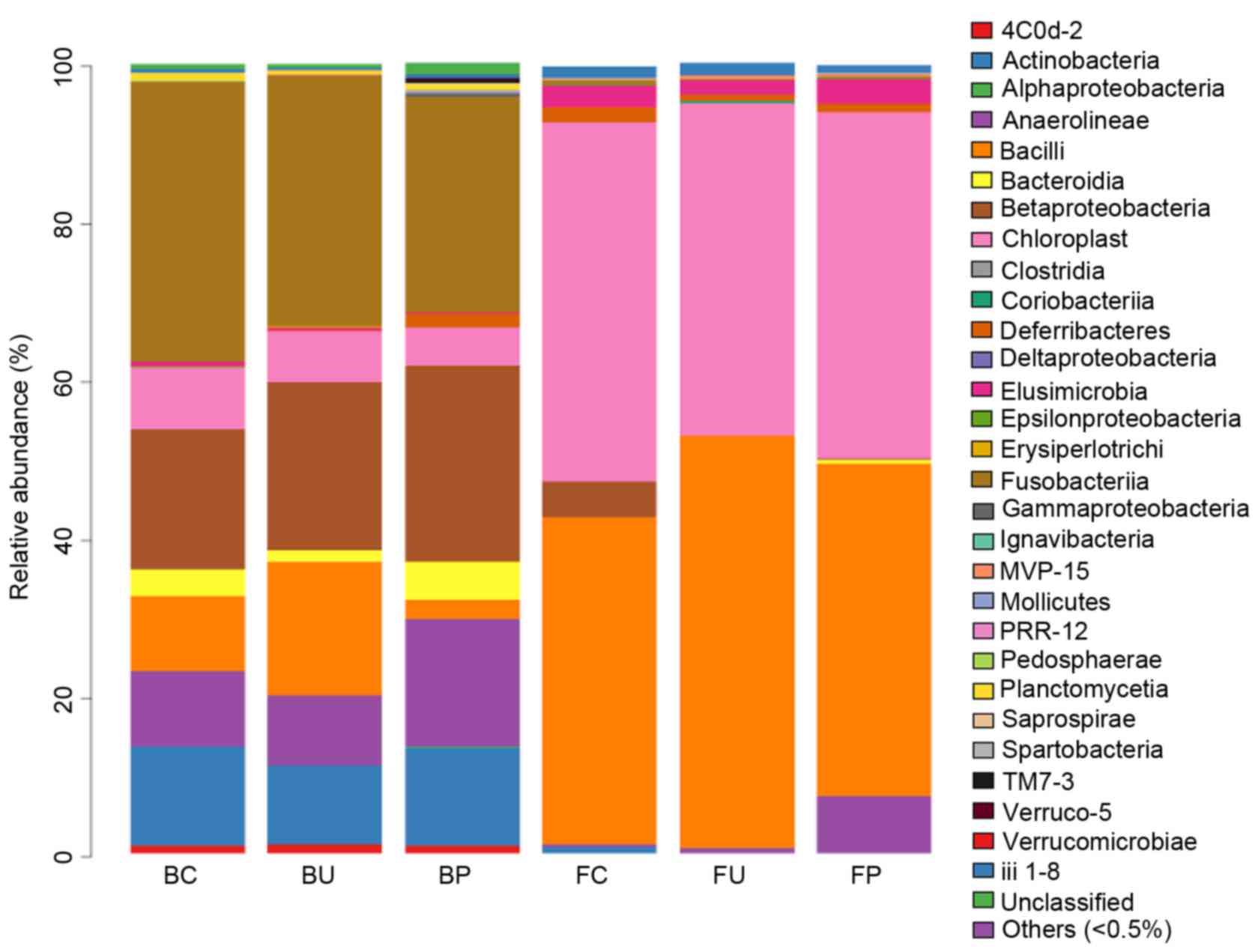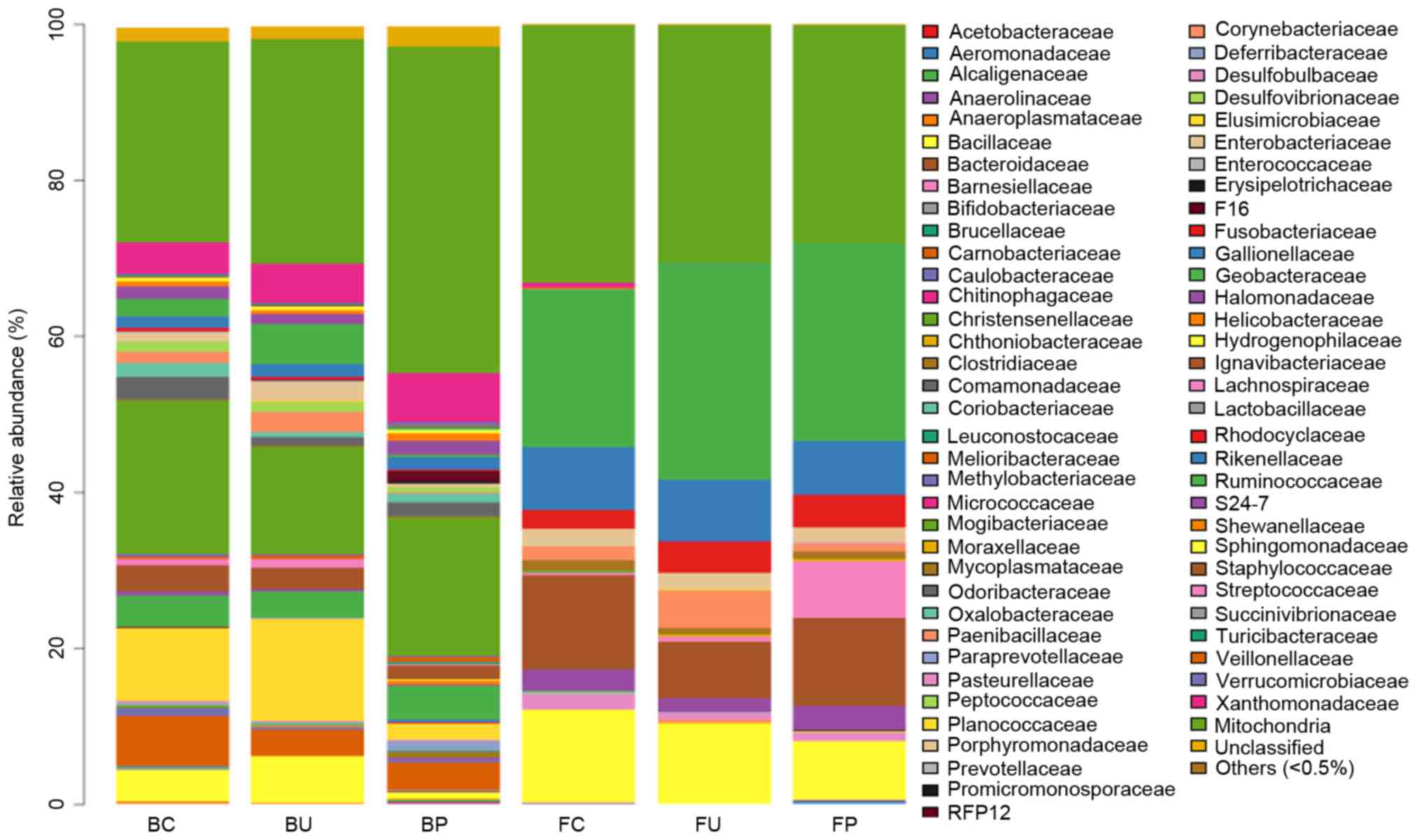|
1
|
Torre LA, Bray F, Siegel RL, Ferlay J,
Lortet-Tieulent J and Jemal A: Global cancer statistics, 2012. CA
Cancer J Clin. 65:87–108. 2015. View Article : Google Scholar : PubMed/NCBI
|
|
2
|
DeSantis CE, Lin CC, Mariotto AB, Siegel
RL, Stein KD, Kramer JL, Alteri R, Robbins AS and Jemal A: Cancer
treatment and survivorship statistics, 2014. CA Cancer J Clin.
64:252–271. 2014. View Article : Google Scholar : PubMed/NCBI
|
|
3
|
Kamada N, Seo SU, Chen GY and Nunez G:
Role of the gut microbiota in immunity and inflammatory disease.
Nat Rev Immunol. 13:321–335. 2013. View
Article : Google Scholar : PubMed/NCBI
|
|
4
|
Seoane A, Bessa X, Balleste B, O'Callaghan
E, Panadès A, Alameda F, Navarro S, Gallén M, Andreu M and Bory F:
Helicobacter pylori and gastric cancer: Relationship with
histological subtype and tumor location. Gastroenterol Hepatol.
28:60–64. 2005.(In Spanish). View
Article : Google Scholar : PubMed/NCBI
|
|
5
|
Smith C: EBV and nasopharyngeal carcinoma:
A target for cellular therapies. Immunotherapy. 5:821–824. 2013.
View Article : Google Scholar : PubMed/NCBI
|
|
6
|
Lynge E and Rebolj M: Primary HPV
screening for cervical cancer prevention: Results from European
trials. Nat Rev Clin Oncol. 6:699–706. 2009. View Article : Google Scholar : PubMed/NCBI
|
|
7
|
Martin R, Miquel S, Langella P and
Bermudez-Humaran LG: The role of metagenomics in understanding the
human microbiome in health and disease. Virulence. 5:413–423. 2014.
View Article : Google Scholar : PubMed/NCBI
|
|
8
|
Schmidt BL, Kuczynski J, Bhattacharya A,
Huey B, Corby PM, Queiroz EL, Nightingale K, Kerr AR, DeLacure MD,
Veeramachaneni R, et al: Changes in abundance of oral microbiota
associated with oral cancer. PLoS One. 9:e987412014. View Article : Google Scholar : PubMed/NCBI
|
|
9
|
Farrell JJ, Zhang L, Zhou H, Chia D,
Elashoff D, Akin D, Paster BJ, Joshipura K and Wong DT: Variations
of oral microbiota are associated with pancreatic diseases
including pancreatic cancer. Gut. 61:582–588. 2012. View Article : Google Scholar : PubMed/NCBI
|
|
10
|
Dejea CM, Wick EC, Hechenbleikner EM,
White JR, Welch Mark JL, Rossetti BJ, Peterson SN, Snesrud EC,
Borisy GG, Lazarev M, et al: Microbiota organization is a distinct
feature of proximal colorectal cancers. Proc Natl Acad Sci USA.
111:18321–18326. 2014. View Article : Google Scholar : PubMed/NCBI
|
|
11
|
Zeller G, Tap J, Voigt AY, Sunagawa S,
Kultima JR, Costea PI, Amiot A, Böhm J, Brunetti F, Habermann N, et
al: Potential of fecal microbiota for early-stage detection of
colorectal cancer. Mol Syst Biol. 10:7662014. View Article : Google Scholar : PubMed/NCBI
|
|
12
|
Han MK, Huang YJ, Lipuma JJ, Boushey HA,
Boucher RC, Cookson WO, Curtis JL, Erb-Downward J, Lynch SV, Sethi
S, et al: Significance of the microbiome in obstructive lung
disease. Thorax. 67:456–463. 2012. View Article : Google Scholar : PubMed/NCBI
|
|
13
|
Garcia-Nuñez M, Millares L, Pomares X,
Ferrari R, Pérez-Brocal V, Gallego M, Espasa M, Moya A and Monsó E:
Severity-related changes of bronchial microbiome in chronic
obstructive pulmonary disease. J Clin Microbiol. 52:4217–4223.
2014. View Article : Google Scholar : PubMed/NCBI
|
|
14
|
Gurwitz D and Lunshof JE: Farm microbiome
and childhood asthma. N Engl J Med. 364:19722011. View Article : Google Scholar : PubMed/NCBI
|
|
15
|
Hosgood HD III, Sapkota AR, Rothman N,
Rohan T, Hu W, Xu J, Vermeulen R, He X, White JR, Wu G, et al: The
potential role of lung microbiota in lung cancer attributed to
household coal burning exposures. Environ Mol Mutagen. 55:643–651.
2014. View
Article : Google Scholar : PubMed/NCBI
|
|
16
|
Stathopoulos GT, Sherrill TP, Cheng DS,
Scoggins RM, Han W, Polosukhin VV, Connelly L, Yull FE, Fingleton B
and Blackwell TS: Epithelial NF-kappa B activation promotes
urethane-induced lung carcinogenesis. Proc Natl Acad Sci USA.
104:18514–18519. 2007. View Article : Google Scholar : PubMed/NCBI
|
|
17
|
Malkinson AM: Role of inflammation in
mouse lung tumorigenesis: A review. Exp Lung Res. 31:57–82. 2005.
View Article : Google Scholar : PubMed/NCBI
|
|
18
|
Dzutsev A, Goldszmid RS, Viaud S, Zitvogel
L and Trinchieri G: The role of the microbiota in inflammation,
carcinogenesis, and cancer therapy. Eur J Immunol. 45:17–31. 2015.
View Article : Google Scholar : PubMed/NCBI
|
|
19
|
Belkaid Y and Hand TW: Role of the
microbiota in immunity and inflammation. Cell. 157:121–141. 2014.
View Article : Google Scholar : PubMed/NCBI
|
|
20
|
de Martel C, Ferlay J, Franceschi S,
Vignat J, Bray F, Forman D and Plummer M: Global burden of cancers
attributable to infections in 2008: A review and synthetic
analysis. Lancet Oncol. 13:607–615. 2012. View Article : Google Scholar : PubMed/NCBI
|
|
21
|
Narayan C and Kumar A: Constitutive over
expression of IL-1β, IL-6, NF-κB, and Stat3 is a potential cause of
lung tumorgenesis in urethane (ethyl carbamate) induced Balb/c
mice. J Carcinog. 11:92012. View Article : Google Scholar : PubMed/NCBI
|
|
22
|
Ihara S, Kida H, Arase H, Tripathi LP,
Chen YA, Kimura T, Yoshida M, Kashiwa Y, Hirata H, Fukamizu R, et
al: Inhibitory roles of signal transducer and activator of
transcription 3 in antitumor immunity during carcinogen-induced
lung tumorigenesis. Cancer Res. 72:2990–2999. 2012. View Article : Google Scholar : PubMed/NCBI
|
|
23
|
Barfod KK, Roggenbuck M, Hansen LH,
Schjorring S, Larsen ST, Sorensen SJ and Krogfelt KA: The murine
lung microbiome in relation to the intestinal and vaginal bacterial
communities. BMC Microbiol. 13:3032013. View Article : Google Scholar : PubMed/NCBI
|
|
24
|
Zhou D, Zhang H, Bai Z, Zhang A, Bai F,
Luo X, Hou Y, Ding X, Sun B, Sun X, et al: Exposure to soil, house
dust and decaying plants increases gut microbial diversity and
decreases serum immunoglobulin E levels in BALB/c mice. Environ
Microbiol. 18:1326–1337. 2015. View Article : Google Scholar : PubMed/NCBI
|
|
25
|
Edgar RC: UPARSE: Highly accurate OTU
sequences from microbial amplicon reads. Nat Methods. 10:996–998.
2013. View Article : Google Scholar : PubMed/NCBI
|
|
26
|
Edgar RC, Haas BJ, Clemente JC, Quince C
and Knight R: UCHIME improves sensitivity and speed of chimera
detection. Bioinformatics. 27:2194–2200. 2011. View Article : Google Scholar : PubMed/NCBI
|
|
27
|
Rodrigues NF, Kästle J, Coutinho TJ,
Amorim AT, Campos GB, Santos VM, Marques LM, Timenetsky J and de
Farias ST: Qualitative analysis of the vaginal microbiota of
healthy cattle and cattle with genital-tract disease. Genet Mol
Res. 14:6518–6528. 2015. View Article : Google Scholar : PubMed/NCBI
|
|
28
|
Ferolla SM, Armiliato GN, Couto CA and
Ferrari TC: The role of intestinal bacteria overgrowth in
obesity-related nonalcoholic fatty liver disease. Nutrients.
6:5583–5599. 2014. View Article : Google Scholar : PubMed/NCBI
|
|
29
|
Karlsson F, Tremaroli V, Nielsen J and
Backhed F: Assessing the Human Gut Microbiota in Metabolic
Diseases. Diabetes. 62:3341–3349. 2013. View Article : Google Scholar : PubMed/NCBI
|
|
30
|
Tong M, Li X, Parfrey Wegener L, Roth B,
Ippoliti A, Wei B, Borneman J, McGovern DP, Frank DN, Li E, et al:
A modular organization of the human intestinal mucosal microbiota
and its association with inflammatory bowel disease. PLoS One.
8:e807022013. View Article : Google Scholar : PubMed/NCBI
|
|
31
|
Ohtani N: Microbiome and cancer. Semin
Immunopathol. 37:65–72. 2015. View Article : Google Scholar : PubMed/NCBI
|
|
32
|
Dickson RP, Martinez FJ and Huffnagle GB:
The role of the microbiome in exacerbations of chronic lung
diseases. Lancet. 384:691–702. 2014. View Article : Google Scholar : PubMed/NCBI
|
|
33
|
Sze MA, Tsuruta M, Yang SW, Oh Y, Man SF,
Hogg JC and Sin DD: Changes in the bacterial microbiota in gut,
blood, and lungs following acute LPS instillation into mice lungs.
PLoS One. 9:e1112282014. View Article : Google Scholar : PubMed/NCBI
|
|
34
|
Madan JC, Koestler DC, Stanton BA,
Davidson L, Moulton LA, Housman ML, Moore JH, Guill MF, Morrison
HG, Sogin ML, et al: Serial analysis of the gut and respiratory
microbiome in cystic fibrosis in infancy: Interaction between
intestinal and respiratory tracts and impact of nutritional
exposures. MBio. 3:e00251–12. 2012. View Article : Google Scholar : PubMed/NCBI
|
|
35
|
Garzoni C, Brugger SD, Qi W, Wasmer S,
Cusini A, Dumont P, Gorgievski-Hrisoho M, Mühlemann K, von Garnier
C and Hilty M: Microbial communities in the respiratory tract of
patients with interstitial lung disease. Thorax. 68:1150–6. 2013.
View Article : Google Scholar : PubMed/NCBI
|
|
36
|
Baxter NT, Zackular JP, Chen GY and
Schloss PD: Structure of the gut microbiome following colonization
with human feces determines colonic tumor burden. Microbiome.
2:202014. View Article : Google Scholar : PubMed/NCBI
|
|
37
|
Schwab C, Berry D, Rauch I, Rennisch I,
Ramesmayer J, Hainzl E, Heider S, Decker T, Kenner L, Müller M, et
al: Longitudinal study of murine microbiota activity and
interactions with the host during acute inflammation and recovery.
ISME J. 8:1101–1114. 2014. View Article : Google Scholar : PubMed/NCBI
|
|
38
|
Vincent C, Stephens DA, Loo VG, Edens TJ,
Behr MA, Dewar K and Manges AR: Reductions in intestinal
Clostridiales precede the development of nosocomial Clostridium
difficile infection. Microbiome. 1:182013. View Article : Google Scholar : PubMed/NCBI
|
|
39
|
Gevers D, Kugathasan S, Denson LA,
Vázquez-Baeza Y, Van Treuren W, Ren B, Schwager E, Knights D, Song
SJ, Yassour M, et al: The treatment-naive microbiome in new-onset
Crohn's disease. Cell Host Microbe. 15:382–392. 2014. View Article : Google Scholar : PubMed/NCBI
|
|
40
|
de La Serre CB, Ellis CL, Lee J, Hartman
AL, Rutledge JC and Raybould HE: Propensity to high-fat
diet-induced obesity in rats is associated with changes in the gut
microbiota and gut inflammation. Am J Physiol Gastrointest Liver
Physiol. 299:G440–G448. 2010. View Article : Google Scholar : PubMed/NCBI
|
|
41
|
Hijazi K, Lowe T, Meharg C, Berry SH,
Foley J and Hold GL: Mucosal Microbiome in Patients with Recurrent
Aphthous Stomatitis. J Dent Res. 94:872015S-94S. View Article : Google Scholar
|
|
42
|
Treda Jan C, Fukuhara T, Suzuki T,
Nakamura A, Zaini J, Kikuchi T, Ebina M and Nukiwa T: Secretory
leukocyte protease inhibitor modulates urethane-induced lung
carcinogenesis. Carcinogenesis. 35:8962014. View Article : Google Scholar : PubMed/NCBI
|















